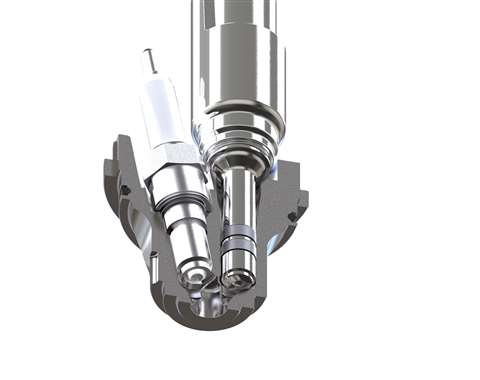Liebherr, Mahle on combustion for heavy-duty hydrogen engines
14 October 2021
Liebherr Machines Bulle SA announced early trial results using Mahle Jet Ignition (MJI) in the development of hydrogen-fuelled internal combustion engines. According to Liebherr, MJT proved to be a successful ignition source for hydrogen without the need to reduce compression ratios, unlocking the potential of hydrogen as a carbon-neutral fuel for the heavy-duty engine sector.
Adaptation of the active pre-chamber to fit in Liebherr’s H966 and H964 engines has shown, in a preliminary investigation, that this technology extends the stable dilution limit of the engine well beyond the capability of traditional ignition systems, with much more rapid and complete combustion.
 Mahle Jet Ignition tested in Liebherr engines running on hydrogen fuel showed no need to reduce compression ratios.
Mahle Jet Ignition tested in Liebherr engines running on hydrogen fuel showed no need to reduce compression ratios.
The challenge with using hydrogen as a combustion fuel is that it is highly prone to abnormal combustion, leading to engine knock and pre-ignition. Typically, this necessitates an inefficient reduction in engine compression ratio. However, a potential alternative is to depress combustion temperatures by using high levels of dilution, which is more conducive to stable running, but would require a high-energy ignition source.
Originally developed for gasoline applications, Mahle’s pre-chamber ignition technology enables the use of highly diluted fuel/ air mixtures, making it ideal for use in hydrogen-fuelled engines. To achieve this, the MJI was adapted, mainly by modifying the pre-chamber in the cylinder head containing a spark plug, which ignites a fuel/ air mixture. The resulting gas plasma is forced through small orifices into the main combustion chamber to ignite the combustion mixture very quickly and uniformly.
“The use of hydrogen as a combustion fuel has the potential for rapid de-carbonization of many heavy-duty and off-road sectors,” said Mike Bunce, head of Research for Mahle Powertrain US. “A wealth of research over the past few decades has confirmed the compatibility of hydrogen with internal combustion engines. The challenge has been to get it to run with stable combustion without resorting to reductions in compression ratios to avoid engine knock and pre-ignition. Our common work with Liebherr suggests we have the answer.”
Bunce added that the active pre-chamber technology will simplify the hardware architecture of the engines and that it enables the mitigation of the compression ratio de-rating risk associated with hydrogen, as well as reducing fuel consumption.
Bouzid Seba, head of Predevelopment at Liebherr Machines Bulle SA, commented that the expertise of Liebherr’s engineering teams in the areas of heavy-duty combustion and alternative fuels research have both been major assets in this program. He also remarked on Liebherr’s openness to technology and the Group’s pursuit of different approaches to energy conversion as well as suitable fuels.
The two companies also commented that, as a fuel for proven and existing internal combustion engine technology in aggressive environments, hydrogen is ideally suited to the high load duty cycles with sudden load steps, heat, dust and vibration of heavy duty and off-road use. This is not the case for battery electric or fuel-cell powertrains.
STAY CONNECTED



Receive the information you need when you need it through our world-leading magazines, newsletters and daily briefings.
CONNECT WITH THE TEAM







